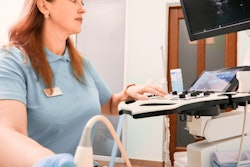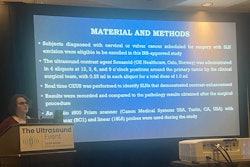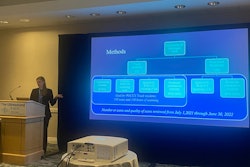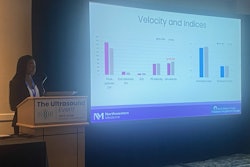ORLANDO -- Radiology still dominates when it comes to interpreting gynecologic ultrasound, but there’s more parity now among specialties in providing this service, according to findings presented at the 2025 American Institute of Ultrasound in Medicine (AIUM) annual conference.
In her presentation, Morgan Snow, MD, from the Orlando Health Winnie Palmer Hospital in Florida discussed her team’s research results, showing that radiologists perform nearly 60% of transvaginal ultrasound (TVUS) exams and more than three-fourths of pelvic nonobstetric ultrasound exams in Medicare patients. However, other specialties such as ob/gyn interpreted a greater proportion of exams over time.
“There is a substantial proportion of ob/gyns providing this service, which has important implications for residency training requirements,” Snow said.
 Morgan Snow, MD, explains her team's results showing how while radiology is still the dominating specialty in providing gynecologic ultrasound services, ob/gyns are gaining ground.
Morgan Snow, MD, explains her team's results showing how while radiology is still the dominating specialty in providing gynecologic ultrasound services, ob/gyns are gaining ground.
Ultrasound is a go-to imaging technique for diagnosing various gynecologic and obstetric conditions. Radiologists traditionally lead interpretation for gynecologic ultrasound studies, even though obstetric ultrasound exams are typically interpreted by obstetricians and gynecologists.
Snow noted that there are limited data examining the proportion of gynecologic sonography services by specialty. She added that gynecologic ultrasound is growing as an independent entity.
Snow and colleagues added to the literature, breaking down interpretation services by specialty for TVUS and pelvic nonobstetric ultrasound exams by analyzing Medicare data collected between 2018 and 2022. They then evaluated trends by geographic region.
Overall, radiologists most commonly performed these pelvic ultrasound services, followed by ob/gyn specialists.
| Frequency of pelvic ultrasound services performed by specialty | ||
|---|---|---|
| Specialty | TVUS exams | Pelvic nonobstetric exams |
| Radiology | 59.7% | 76.4% |
| Ob/gyn | 36.7% | 12.8% |
| Urology | 0.1% | 6.9% |
| Advanced practice | 0.6% | 0.4% |
| Other physician specialties | 0.7% | 3.2% |
However, the proportion of radiology-interpreted exams decreased over the five-year study period. The Northeast region experienced the largest decrease in pelvic nonobstetric exams interpreted by radiologists, falling from 75.4% in 2018 to 69.8% in 2022.
Also, the Southern region saw a greater share of ob/gyn specialists interpreting TVUS exams in 2022 than radiologists (49% versus 45.5%). Snow said this finding is of interest for future studies.
She highlighted that these findings could help inform regulations and standardization of performing these services.
“Training and quality monitoring will be key going forward, given the increasing diversity of specialties and provider types engaged in gynecologic ultrasound,” Snow said.



















